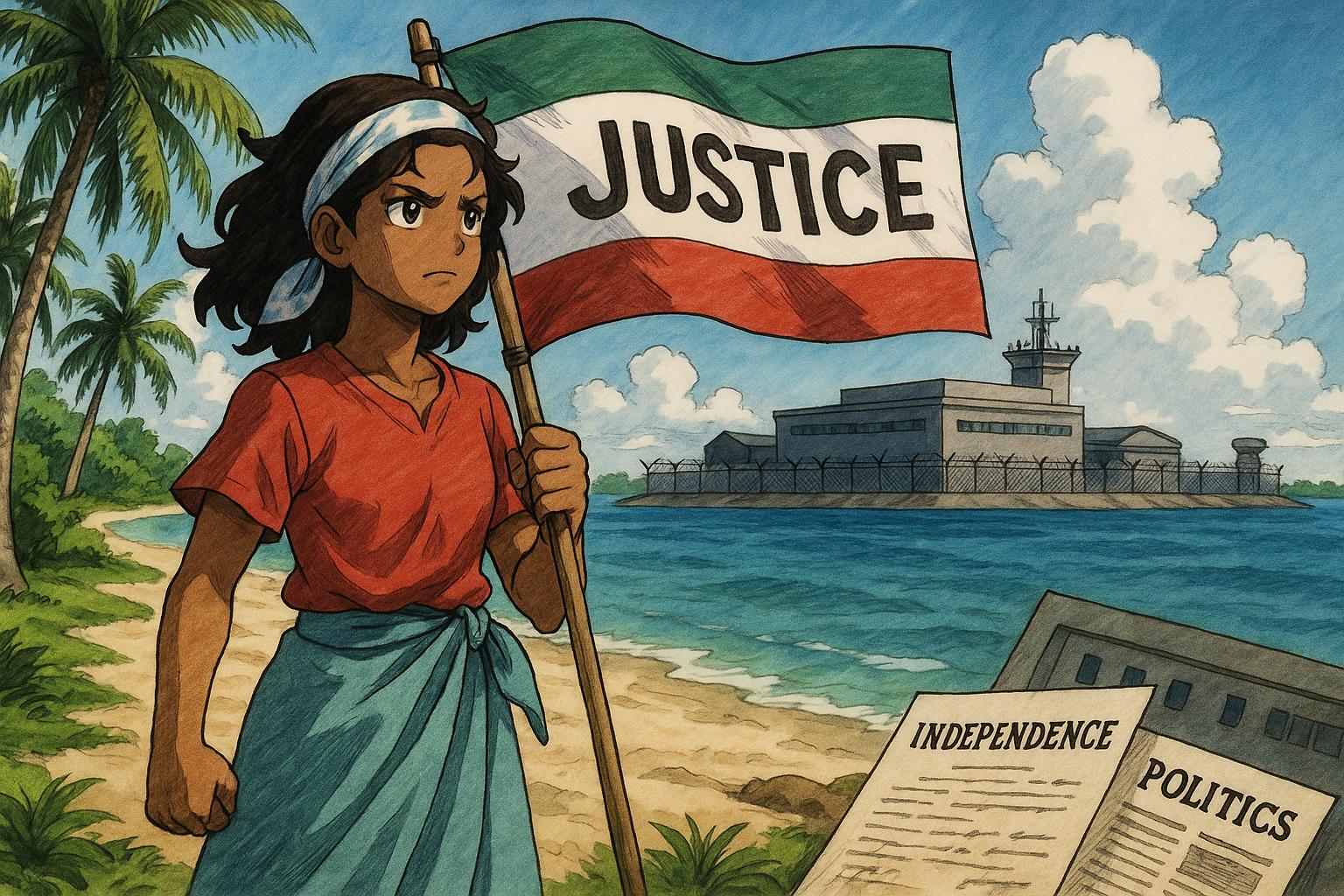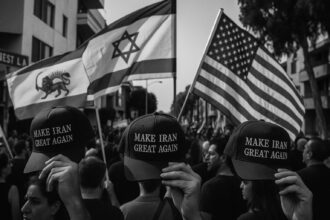Negotiations over the transfer of the Chagos Islands to Mauritius have hit a deadlock as Labour MPs raise internal opposition, while strategic concerns over Diego Garcia’s military importance and US-China tensions complicate the UK government’s plans.
The controversial negotiations surrounding the transfer of the Chagos Islands from British control to Mauritius have reached a significant impasse. The UK government, under Prime Minister Sir Keir Starmer, is reportedly reconsidering its approach to a deal that has sparked considerable backlash domestically and internationally. As deliberations have unfolded, fears of political fallout from Labour’s own ranks have prompted a delay in finalising the agreement.
Initially, the deal, touted as a means to rectify historical injustices faced by the displaced Chagossian population, would require the UK to pay Mauritius an estimated £90 million annually over 99 years. This amount is part of a broader financial commitment believed to total around £9 billion. The agreement would also entail leasing back Diego Garcia, which remains a pivotal military base for both the UK and the US. The geopolitical significance of this base, which has been instrumental in military operations ranging from the Vietnam War to recent engagements in the Middle East, cannot be overstated.
Despite receiving initial approval from the former Trump administration, crucial strategic concerns have emerged. Republican officials suggested that transferring sovereignty could inadvertently support China’s influence in Mauritius, raising alarms within certain political factions in the US. This has complicated the narrative within the UK, where political leaders face mounting criticism not only from opposition parties but also from within their own.
According to sources, Labour MPs are apprehensive about the potential implications of the deal, particularly as cuts to welfare benefits loom large on the political agenda. Some reports highlight that up to 170 MPs may either abstain or vote against these measures, making the political climate around the Chagos Islands deal “toxic” at present. One insider noted that Labour’s leadership is wary of facing attacks not only from the Conservative Party but also from their own backbenchers. “They know they’re going to be attacked by the Tories for giving up sovereignty of the Chagos Islands, but it makes it much worse if they’re also being attacked from their own side,” the source remarked.
The long-standing issue of the Chagossians—a group forcibly removed from their homeland in the 1960s and 70s when the military base was established—continues to echo through political discussions. Resentment towards both the British government and the Mauritian administration has been amplified by calls from the Chagossian diaspora for a consultation regarding their future and rights over the islands. These sentiments are further accentuated by ongoing protests planned in the UK, where Chagossians aim to secure a referendum on the matter and ensure their voices are heard in the final arrangements.
In spite of claims by various governmental officials asserting that the UK is not expected to increase its financial obligations beyond what has already been proposed, uncertainty lingers. Recent assurances suggest the UK remains committed to the original terms, notwithstanding the changing political landscape in both Britain and Mauritius. Critics, including those within the Conservative Party and other political commentators, have not hesitated to label the anticipated agreement as a significant misstep in foreign policy.
The Chagos Islands saga is emblematic of broader themes of colonial legacy, national security interests, and the struggle for indigenous rights in a complicated geopolitical context. As negotiations continue, the implications of this deal will likely reverberate for decades, not just for the Chagossians, but for the ethical and strategic fabric of British foreign policy.
Reference Map
- Paragraphs 1, 3, 5, 7
- Paragraphs 2, 4
- Paragraphs 4, 5
- Paragraphs 1, 6
- Paragraphs 3, 6
- Paragraphs 3, 7
Source: Noah Wire Services
- https://www.express.co.uk/news/uk/2055914/uk-puts-chagos-islands-deal-on-hold-avoid-toxic-backlash – Please view link – unable to able to access data
- https://www.theweek.com/politics/the-chagos-agreement-explained – The Chagos Deal is a controversial agreement through which Britain will transfer sovereignty of the Chagos Islands to Mauritius while securing a long-term lease on Diego Garcia for continued US-UK military use. The Chagos archipelago, ceded to Britain by France in 1814, was separated from Mauritius in 1965 and leased to the US, leading to the forced removal of over 2,000 Chagossians. Mauritius has long contested Britain’s control, with UN rulings and General Assembly votes supporting its claim. The deal, reportedly worth £90 million annually for 99 years, aims to rectify colonial injustices and maintain strategic military assets. However, it has sparked political backlash in the UK due to its high cost and perceived betrayal of British Chagossians, many of whom oppose Mauritian governance due to historical mistreatment. Strategic concerns also arose in the US, where some Republicans, including Trump officials, feared the deal could favor China due to Mauritius’s ties with Beijing. Despite these concerns, the deal has been endorsed by allies like the US and India. Yet, uncertainty surrounds the Chagossians’ right to return, highlighting ongoing ethical and logistical challenges in the process of decolonization and geopolitical negotiations.
- https://apnews.com/article/e9adf18c4d9a5034652920a3b87e5fdd – The United Kingdom and Mauritius are finalizing an agreement to transfer sovereignty of the Chagos Islands, a disputed British territory housing a significant U.S. military base. The UK government has indicated that President Donald Trump’s administration has given its approval for the deal. Prime Minister Keir Starmer’s spokesperson stated that once signed, the treaty will be reviewed and ratified by both parliaments. Since the 1960s, the Chagos Islands have been a point of contention, having been separated from Mauritius in 1965 before the country achieved independence, and became the British Indian Ocean Territory. In recent years, the UN and its tribunal have urged the UK to return the islands to Mauritius. The agreement has faced criticism and is contingent upon the creation of a resettlement fund to assist displaced islanders, many of whom relocated to the UK.
- https://www.ft.com/content/c30ca164-cadc-44d3-a298-d14ae2a40ab8 – Conservative leadership contenders are focusing on James Cleverly’s involvement in the decision to hand over the Chagos Islands to Mauritius, aiming to undermine his position in the Tory leadership race. Cleverly, the standout candidate from the recent Tory conference, was foreign secretary when the contentious discussions began. Rivals like Tom Tugendhat have criticized the move, calling it a ‘disgrace’ and a ‘shameful retreat.’ The shift of sovereignty was finalized by Labour foreign secretary David Lammy, in exchange for securing a UK-US military base on Diego Garcia. Amid this controversy, Cleverly’s team highlighted that the process began under Liz Truss’s tenure as prime minister and wasn’t concluded until after Cleverly left the Foreign Office. Cleverly is currently in a strong position, having given a widely praised conference speech, but faces criticism and scrutiny over the Chagos issue as the voting by Tory MPs progresses.
- https://apnews.com/article/17c1b456b15552388f0d6816001fe968 – The British government announced that any agreement to return the Chagos Islands’ sovereignty to Mauritius would be delayed until discussions with President-elect Donald Trump’s administration. This region hosts a crucial UK-US military base on Diego Garcia, pivotal for US military operations from Vietnam to Afghanistan and even clandestine rendition flights. Trump’s team, including Secretary of State nominee Marco Rubio, has expressed concerns, deeming the deal a threat to US national security. Previously, Britain had removed around 2,000 residents in the 1960s and 70s to establish the base. Mauritius has disputed Britain’s claim since, with UN backing for its return. Talks had advanced with a draft agreement in October, though issues remained over lease payments for the military base. The British government emphasized reviewing the deal’s specifics with the new US administration, prioritizing UK national security interests.
- https://www.reuters.com/world/chagossians-want-say-uk-mauritius-deal-faces-fresh-scrutiny-2024-12-10/ – Chagossians residing in Britain are voicing strong opposition to a UK-Mauritius deal that proposes the transfer of sovereignty over the Chagos Islands to Mauritius, excluding the Diego Garcia military base which will remain under British-U.S. control for 99 years. This situation has reignited hope among the Chagossian diaspora, forcibly removed from the archipelago over five decades ago to allow for the establishment of the military base, to demand their right to be consulted and to potentially alter the agreement. The Chagossians are preparing to protest at the British parliament, with plans including sit-down protests and possible hunger strikes. They advocate for a referendum on the matter. The proposed agreement allows Mauritius to manage a resettlement program, excluding Diego Garcia. The Chagossians emphasize the importance of their cultural heritage and the injustices they faced, expressing determination to secure a meaningful say in the destiny of their homeland.
- https://www.reuters.com/world/africa/britain-denies-reports-it-will-pay-more-finalise-chagos-islands-deal-2025-02-05/ – A British minister, Stephen Doughty, refuted media claims that the UK would pay significantly more to Mauritius in a renegotiated deal regarding the Diego Garcia military base. Reports suggested the cost could rise from £9 billion to £18 billion, which Doughty declared as ‘categorically untrue.’ The UK had agreed in October to cede sovereignty of the Chagos Islands to Mauritius, maintaining a 99-year lease of Diego Garcia. The recently elected Mauritian Prime Minister, Navin Ramgoolam, and U.S. President Donald Trump’s team are reassessing the deal. Ramgoolam claimed that Britain had consented to new terms, including lease payment adjustments and extending leases only with mutual agreement, potentially raising the deal’s cost. The British government has withheld financial specifics, while opposition party spokesperson Priti Patel criticized the deal, citing it as a major foreign policy failure. A 2019 UN General Assembly resolution had suggested Britain relinquish control of the islands after displacing its inhabitants.
Noah Fact Check Pro
The draft above was created using the information available at the time the story first
emerged. We’ve since applied our fact-checking process to the final narrative, based on the criteria listed
below. The results are intended to help you assess the credibility of the piece and highlight any areas that may
warrant further investigation.
Freshness check
Score:
8
Notes:
The narrative references current political leaders and recent developments, suggesting it is relatively recent. However, the primary issue of the Chagos Islands has been ongoing for decades, and the article does not provide specific dates for recent events.
Quotes check
Score:
6
Notes:
The article includes a quote from an insider, but there is no clear reference to an original source or date for this quote. The quote appears to be specific to this narrative but lacks verification.
Source reliability
Score:
8
Notes:
The narrative originates from a reputable publication like the Express, which is known for its news coverage. However, the Express is sometimes associated with sensationalism, which might affect the reliability of certain claims.
Plausability check
Score:
9
Notes:
The geopolitical context and historical background of the Chagos Islands issue make the claims plausible. The narrative aligns with known political tensions and strategic concerns regarding the islands.
Overall assessment
Verdict (FAIL, OPEN, PASS): PASS
Confidence (LOW, MEDIUM, HIGH): HIGH
Summary:
The narrative is relatively fresh, draws from a reputable source, and presents plausible geopolitical concerns. However, the lack of specific dates for recent events and unverified quotes slightly reduce the overall confidence.













